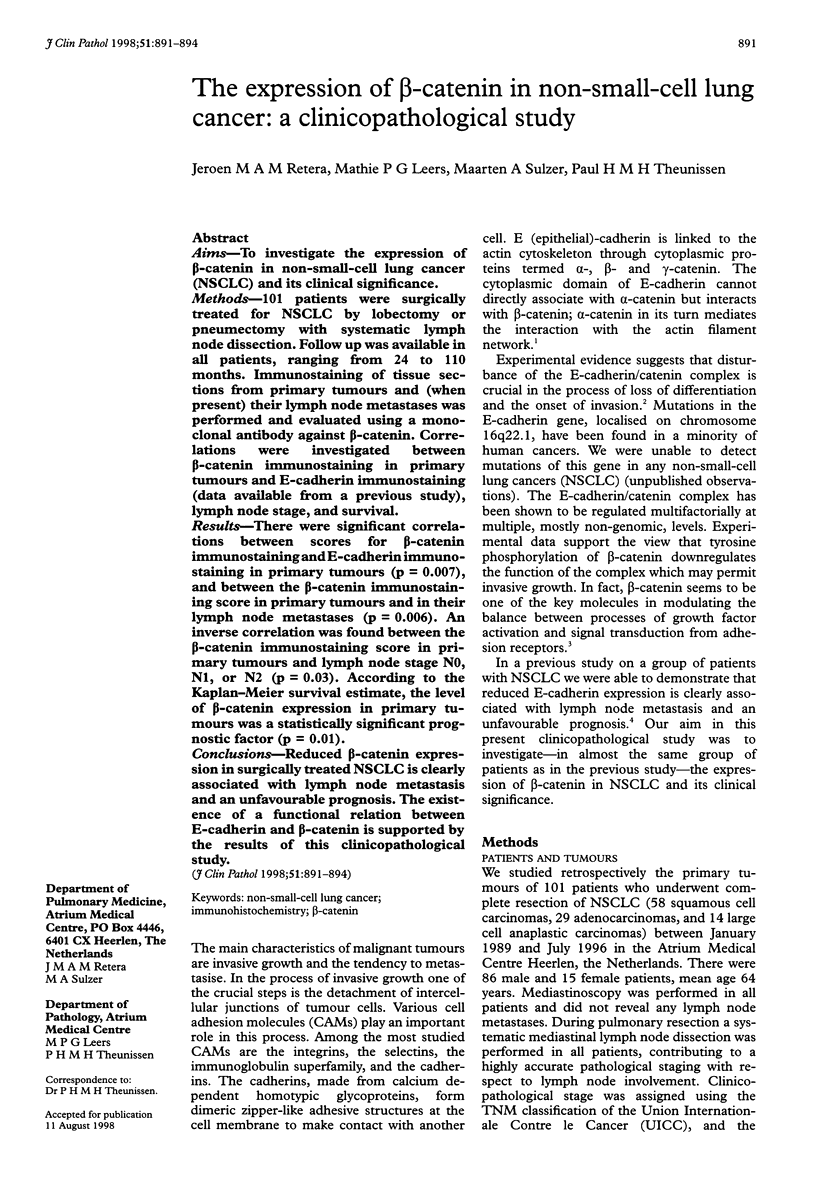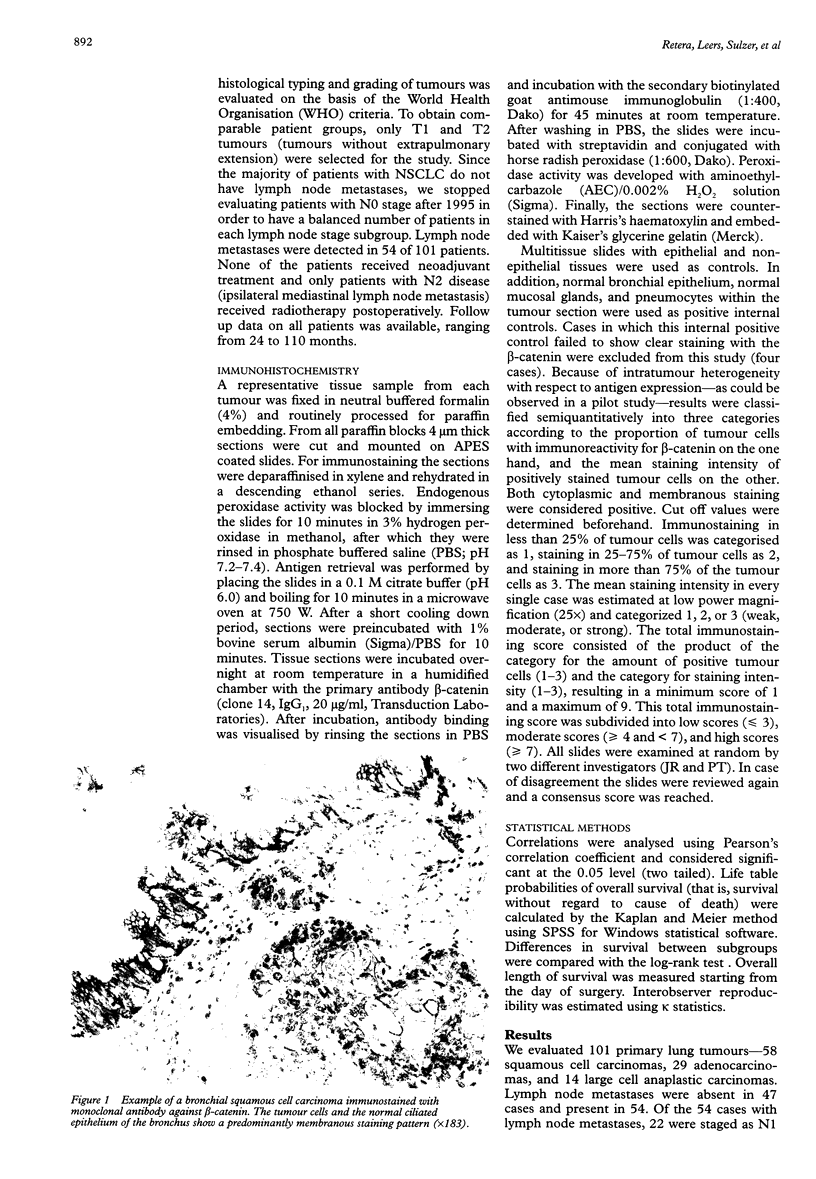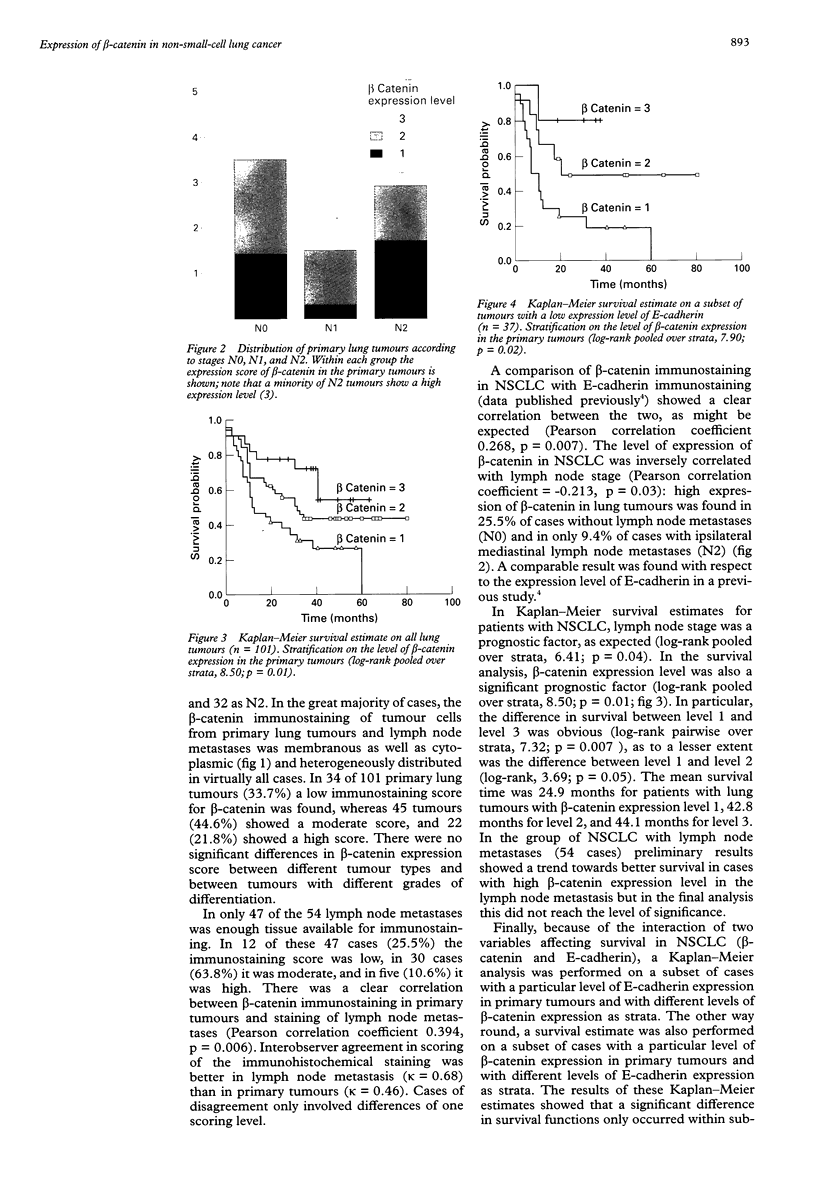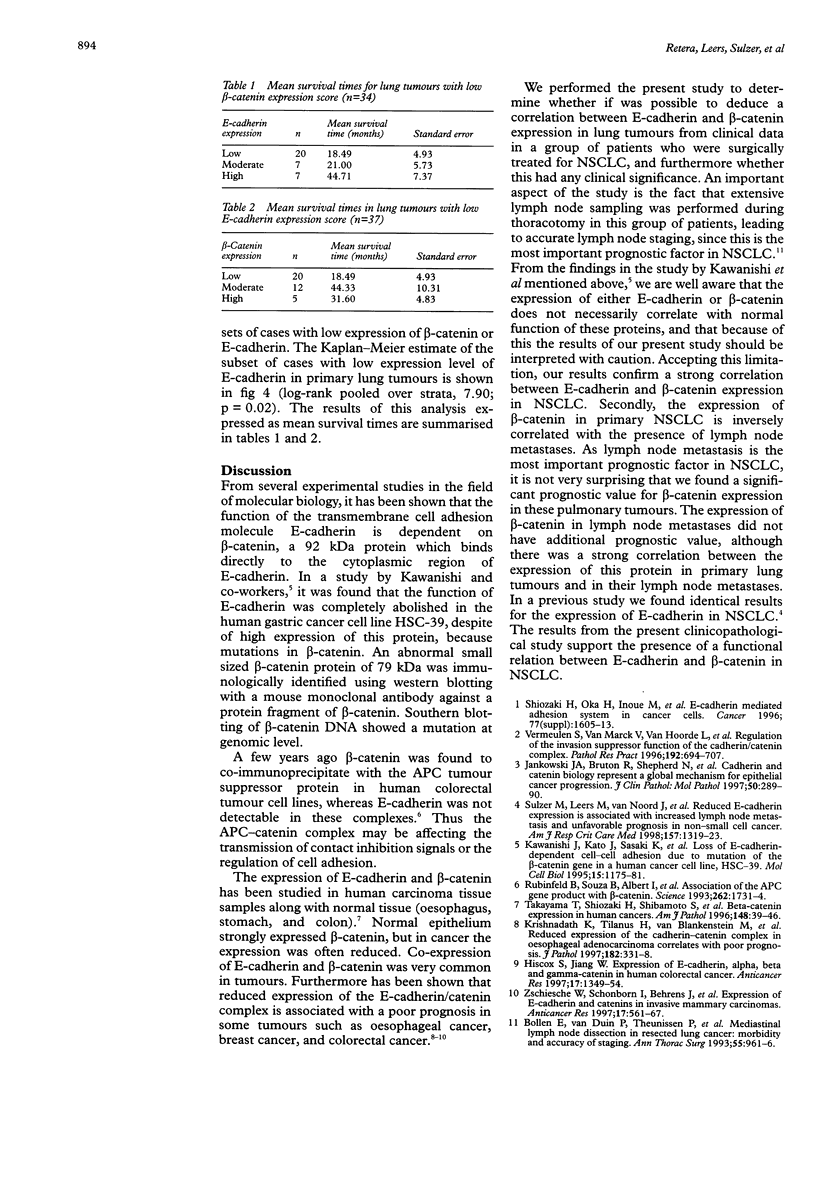Abstract
AIMS: To investigate the expression of beta-catenin in non-small-cell lung cancer (NSCLC) and its clinical significance. METHODS: 101 patients were surgically treated for NSCLC by lobectomy or pneumectomy with systematic lymph node dissection. Follow up was available in all patients, ranging from 24 to 110 months. Immunostaining of tissue sections from primary tumours and (when present) their lymph node metastases was performed and evaluated using a monoclonal antibody against beta-catenin. Correlations were investigated between beta-catenin immunostaining in primary tumours and E-cadherin immunostaining (data available from a previous study), lymph node stage, and survival. RESULTS: There were significant correlations between scores for beta-catenin immunostaining and E-cadherin immunostaining in primary tumours (p = 0.007), and between the beta-catenin immunostaining score in primary tumours and in their lymph node metastases (p = 0.006). An inverse correlation was found between the beta-catenin immunostaining score in primary tumours and lymph node stage N0, N1, or N2 (p = 0.03). According to the Kaplan-Meier survival estimate, the level of beta-catenin expression in primary tumours was a statistically significant prognostic factor (p = 0.01). CONCLUSIONS: Reduced beta-catenin expression in surgically treated NSCLC is clearly associated with lymph node metastasis and an infavourable prognosis. The existence of a functional relation between E-cadherin and beta-catenin is supported by the results of this clinicopathological study.
Full text
PDF



Images in this article
Selected References
These references are in PubMed. This may not be the complete list of references from this article.
- Bollen E. C., van Duin C. J., Theunissen P. H., vt Hof-Grootenboer B. E., Blijham G. H. Mediastinal lymph node dissection in resected lung cancer: morbidity and accuracy of staging. Ann Thorac Surg. 1993 Apr;55(4):961–966. doi: 10.1016/0003-4975(93)90126-3. [DOI] [PubMed] [Google Scholar]
- Hiscox S., Jiang W. G. Expression of E-cadherin, alpha, beta and gamma-catenin in human colorectal cancer. Anticancer Res. 1997 Mar-Apr;17(2B):1349–1354. [PubMed] [Google Scholar]
- Jankowski J. A., Bruton R., Shepherd N., Sanders D. S. Cadherin and catenin biology represent a global mechanism for epithelial cancer progression. Mol Pathol. 1997 Dec;50(6):289–290. doi: 10.1136/mp.50.6.289. [DOI] [PMC free article] [PubMed] [Google Scholar]
- Kawanishi J., Kato J., Sasaki K., Fujii S., Watanabe N., Niitsu Y. Loss of E-cadherin-dependent cell-cell adhesion due to mutation of the beta-catenin gene in a human cancer cell line, HSC-39. Mol Cell Biol. 1995 Mar;15(3):1175–1181. doi: 10.1128/mcb.15.3.1175. [DOI] [PMC free article] [PubMed] [Google Scholar]
- Krishnadath K. K., Tilanus H. W., van Blankenstein M., Hop W. C., Kremers E. D., Dinjens W. N., Bosman F. T. Reduced expression of the cadherin-catenin complex in oesophageal adenocarcinoma correlates with poor prognosis. J Pathol. 1997 Jul;182(3):331–338. doi: 10.1002/(SICI)1096-9896(199707)182:3<331::AID-PATH860>3.0.CO;2-D. [DOI] [PubMed] [Google Scholar]
- Rubinfeld B., Souza B., Albert I., Müller O., Chamberlain S. H., Masiarz F. R., Munemitsu S., Polakis P. Association of the APC gene product with beta-catenin. Science. 1993 Dec 10;262(5140):1731–1734. doi: 10.1126/science.8259518. [DOI] [PubMed] [Google Scholar]
- Shiozaki H., Oka H., Inoue M., Tamura S., Monden M. E-cadherin mediated adhesion system in cancer cells. Cancer. 1996 Apr 15;77(8 Suppl):1605–1613. doi: 10.1002/(SICI)1097-0142(19960415)77:8<1605::AID-CNCR28>3.0.CO;2-2. [DOI] [PubMed] [Google Scholar]
- Sulzer M. A., Leers M. P., van Noord J. A., Bollen E. C., Theunissen P. H. Reduced E-cadherin expression is associated with increased lymph node metastasis and unfavorable prognosis in non-small cell lung cancer. Am J Respir Crit Care Med. 1998 Apr;157(4 Pt 1):1319–1323. doi: 10.1164/ajrccm.157.4.9703099. [DOI] [PubMed] [Google Scholar]
- Takayama T., Shiozaki H., Shibamoto S., Oka H., Kimura Y., Tamura S., Inoue M., Monden T., Ito F., Monden M. Beta-catenin expression in human cancers. Am J Pathol. 1996 Jan;148(1):39–46. [PMC free article] [PubMed] [Google Scholar]
- Vermeulen S., Van Marck V., Van Hoorde L., Van Roy F., Bracke M., Mareel M. Regulation of the invasion suppressor function of the cadherin/catenin complex. Pathol Res Pract. 1996 Jul;192(7):694–707. doi: 10.1016/S0344-0338(96)80091-4. [DOI] [PubMed] [Google Scholar]
- Zschiesche W., Schönborn I., Behrens J., Herrenknecht K., Hartveit F., Lilleng P., Birchmeier W. Expression of E-cadherin and catenins in invasive mammary carcinomas. Anticancer Res. 1997 Jan-Feb;17(1B):561–567. [PubMed] [Google Scholar]





